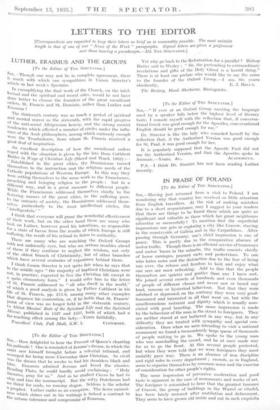LETTERS TO THE EDITOR
[Correspondents are requested to keep their letters as brief as is reasonably possible. The most suitable length is that of one of our " News of the Week " paragraphs. Signed letters are given a preference over those bearing a pseudonym.—Ed. THE SPECTATOR.] LUTHER, ERASMUS AND THE GROUPS [To the Editor of THE SPECTATOR.] 8"1,---Though one may not be in complete agreement, there is much with which one sympathises in Canon Streeter's article in last week's Spectator.
In exemplifying the dual work of the Church, on the intel- lectual and the spiritual and moral sides, would he not have gone better to choose the founders of the great mendicant orders, St. Francis and St. Dominic, rather than Luther and Erasmus ?
The thirteenth century was as much a period of spiritual and • mental unrest as the sixteenth, with the rapid progress of the anti-social Albigensian heresy, and the strong monist tendencies which affected a number of circles under the influ- ence of the Arab philosophers, among which curiously enough were the Troubadours, from whom St. Francis received a good deal of inspiration.
An . excellent description of how the mendicant orders Butler with the situation is given by the late Dom Cuthbert Butler in Ways of Christian Life (Sheed and Ward, 1032) :— `! Established in the great cities, the Dominicans turned themselves to the instruction and the religious needs of the Catholic populations of Western Europe. In this way they Were setting themselves to the same work as the Franciscans, preaching and bringing religion to the People : but in a different way, and in a great measure to different people. While the .Franciscans addressed themselves chiefly to the festering masses of the great cities, to the suffering poor, to the outcasts of society, the Dominicans addressed them- selves particularly to the most intellectual circles, the . intelligentsia.'
I think that everyone will grant the wonderful effectiveness of their work, but on the other hand there are many who look. on Luther, however good his intentions, as responsible for a state of havoc from the results of which Europe is still suffering, the result of his refusal to listen to authority.
There are many who are watching the Oxford Groups with not unfriendly eyes, but who see serious troubles ahead of them if they continue to neglect the wisdom, not only of the oldest branch of Christianity, but of other branches which have several centuries of experience behind them. I think Canon Streeter is not quite fair when he says that in the middle ages " the majority of baptised Christians were not, in practice, expected to live the Christian life except in a quite elementary form." I would refer him to the letter of St. Francis addressed to " all who 'dwell in the world," of which a good analysis is given by Father Cuthbert in his life of St. Francis, pp. 275-8, among many other examples that disprove his contention, or, if be holds that St. Francis' Point of view was no longer held in the sixteenth century, to Abbot Blasius' Rule of the Spiritual Life and the Spiritual Mirror, published in 1587 and 1557, both of which had a far-reaching effect among the laity,—Yours faithfully,






































 Previous page
Previous page